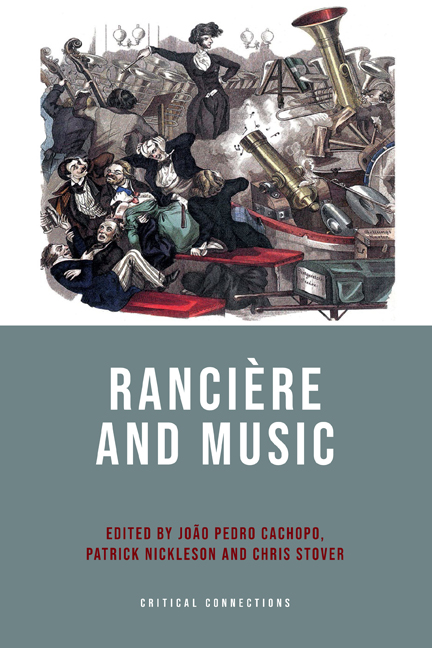Book contents
- Frontmatter
- Contents
- List of Examples
- Acknowledgements
- Notes on Contributors
- Introduction
- Part I: Music and Noise
- 1 Musique concrète and the Aesthetic Regime of Art
- 2 ‘Rip it up and start again’: Reconfigurations of the Audible under the Aesthetic Regime of the Arts
- 3 A Lesson in Low Music
- Part II: Politics of History
- 4 Wandering with Rancière: Sound and Structure under the Aesthetic Regime
- 5 Staging Music in the Aesthetic Regime of Art: Rancière, Berlioz and the Bells of Harold en Italie
- 6 Rancière on Music, Rancière’s Non-music
- 7 Coloured Opera and the Violence of Dis-identification
- Part III: Politics of Interaction
- 8 Musical Politics in the Cuban Police Order
- 9 Rancière and Improvisation: Reading Contingency in Music and Politics
- 10 Rancière’s Affective Impropriety
- Part IV: Encounters and Challenges
- 11 Rancière, Resistance and the Problem of Commemorative Art: Music Displacing Violence Displacing Music
- 12 Stain
- 13 On Shoemakers and Related Matters: Rancière and Badiou on Richard Wagner
- 14 Roll Over the Musical Boundaries: A Few Milestones for the Implementation of an Equal Method in Musicology
- Afterword
- A Distant Sound
- Works Cited
- Index
10 - Rancière’s Affective Impropriety
Published online by Cambridge University Press: 03 October 2020
- Frontmatter
- Contents
- List of Examples
- Acknowledgements
- Notes on Contributors
- Introduction
- Part I: Music and Noise
- 1 Musique concrète and the Aesthetic Regime of Art
- 2 ‘Rip it up and start again’: Reconfigurations of the Audible under the Aesthetic Regime of the Arts
- 3 A Lesson in Low Music
- Part II: Politics of History
- 4 Wandering with Rancière: Sound and Structure under the Aesthetic Regime
- 5 Staging Music in the Aesthetic Regime of Art: Rancière, Berlioz and the Bells of Harold en Italie
- 6 Rancière on Music, Rancière’s Non-music
- 7 Coloured Opera and the Violence of Dis-identification
- Part III: Politics of Interaction
- 8 Musical Politics in the Cuban Police Order
- 9 Rancière and Improvisation: Reading Contingency in Music and Politics
- 10 Rancière’s Affective Impropriety
- Part IV: Encounters and Challenges
- 11 Rancière, Resistance and the Problem of Commemorative Art: Music Displacing Violence Displacing Music
- 12 Stain
- 13 On Shoemakers and Related Matters: Rancière and Badiou on Richard Wagner
- 14 Roll Over the Musical Boundaries: A Few Milestones for the Implementation of an Equal Method in Musicology
- Afterword
- A Distant Sound
- Works Cited
- Index
Summary
The foundation of politics … is the lack of foundation, the sheer contingency of any social order. Politics exists simply because no social order is based on nature, no divine law regulates human society.
In the Dionysian state … the whole affective system is excited and enhanced: so that it discharges all its means of expression at once and drives forth simultaneously the power of representation, imitation, transfiguration, transformation … The Dionysian … enters into any skin, into any affect: he constantly transforms himself. Music, as we understand it today, is also a total excitement and a total discharge of the affects …
I always thought I was shaking people up, but now I want to go at it more, and I want to go at it more deliberately, and I want to go at it coldly– I want to shake people up so bad that when they leave a nightclub where I performed I just want them to be in pieces.
‘Politics for Rancière … begins with an act of aesthetic impropriety.’Such an act proceeds as a partaking of sensibilities and modes of participation by an individual or group that has not been given the right to do so within a given temporal, spatial and relational distribution. Politics, then, as the aesthetic practice of dissensus that reveals how the conditions of existing configurations determine what is sensible and how, is in every event an action or constellation of actions that exists only in the staging of a singular scene. This is what makes politics aesthetic. While its singularity disallows a fully transferable or generalisable ‘Rancièrean theory’ of political action, it also brings into relief the affective relationality of any given event in terms of the movements of affective forces that reconfigure and newly constitute bodies (human and otherwise) in new relational dispositions. It is only in the enactment of an individual act, the staging of a singular scene, that politics unfolds.
Rancière insists, therefore, that politics occurs only rarely.
- Type
- Chapter
- Information
- Ranciere and Music , pp. 230 - 262Publisher: Edinburgh University PressPrint publication year: 2020



